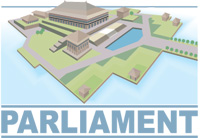Columns
Disruptive politics continue as the flipside of majority of convenience
The opposition within the Opposition got off to a fighting start in Parliament this week, staging a walkout in protest at the manner in which the Government introduced several finance regulations, prompting Prime Minister Ranil Wickremesinghe to declare, “what we have in the country today is a dictatorial Opposition and democratic government.”
 It was a sure sign that the theatrical politics that dominated the previous Parliament is likely to continue in the new Legislature too, with added confusion about who constitutes the “real Opposition” in a setup where the two main parties in Government number close to 200 seats in the 225-Member Legislature.
It was a sure sign that the theatrical politics that dominated the previous Parliament is likely to continue in the new Legislature too, with added confusion about who constitutes the “real Opposition” in a setup where the two main parties in Government number close to 200 seats in the 225-Member Legislature.
At least 30 MPs including UPFA MPs Dinesh Gunawardena, Vasudeva Nanaykkara, Bandula Gunawardena and Kumar Welgama participated, saying the regulations were being taken up for debate without sufficient time given to study them.
The regulations introduced by Finance Minister Ravi Karunanayake related to money appropriated in 2014, and despite the protest, Speaker Karu Jayasuriya allowed the debate to go ahead, but said the vote on it would be taken in early October.
It was Prime Minister Wickremesinghe who dominated the two days of sittings this week, making two important statements to the House. They were the developments in the UN Human Rights Council (HRC) on Sri Lanka, and his official visit to India earlier this month.
In his statement regarding the UNHRC issue, Mr Wickremesinghe outlined the measures the Government proposes to make, to ensure that the grievances of war victims are addressed, as well as to ensure there is no repetition of past mistakes. “To avoid a recurrence of the unpleasant experiences of the past, we need to address the grievances of minorities. It is essential to seek political solutions to address the problems they face,” he said.
The Prime Minister said a Parliamentary debate on the UNHRC resolution that is to be adopted next week will be held next month. He also briefed the House on his official visit to India and denied reports of discussions regarding the building of a bridge linking the two countries, and the proposed Comprehensive Economic Partnership Agreement (CEPA) between the two countries. However, the Prime Minister said the two sides had discussed the commencement of a ferry service between the two countries.
“There were no talks held on CEPA and there was no proposal to have CEPA on the agenda by either side during this visit. I was also surprised to see newspaper reports of a bridge linking the two countries. Such reports are published to mislead the people,” he said.With Appropriation Bill 2016 expected to be tabled in the House next month, and the presentation due in November, Parliament sittings are likely to generate much more heat in the weeks ahead.



Leave a Reply
Post Comment